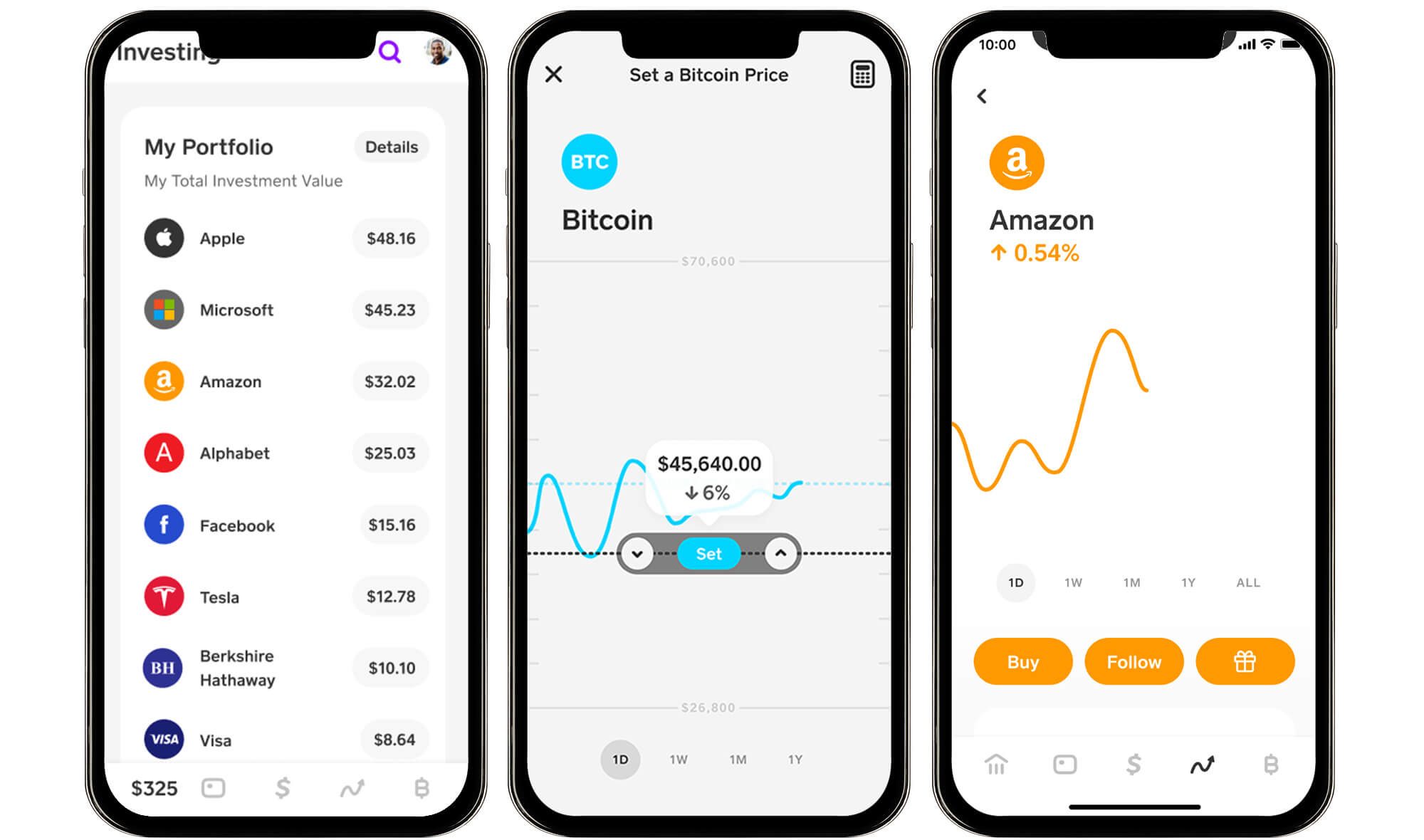

Finance
What Stocks To Invest In On Cash App
Modified: January 19, 2024
Looking to invest in stocks on Cash App? Discover the best finance options and start growing your wealth today with our expert recommendations.
(Many of the links in this article redirect to a specific reviewed product. Your purchase of these products through affiliate links helps to generate commission for LiveWell, at no extra cost. Learn more)
Table of Contents
- Introduction
- Understanding Cash App
- Benefits of Investing on Cash App
- Factors to Consider Before Investing on Cash App
- Top Stocks to Invest in on Cash App
- Apple Inc. (AAPL)
- Amazon.com Inc. (AMZN)
- Microsoft Corporation (MSFT)
- Alphabet Inc. (GOOGL)
- Tesla Inc. (TSLA)
- Facebook Inc. (FB)
- Netflix Inc. (NFLX)
- Johnson & Johnson (JNJ)
- Visa Inc.
- JPMorgan Chase & Co.
- Conclusion
Introduction
Welcome to the world of investing, where you have the opportunity to grow your wealth and achieve your financial goals. If you’re new to investing or looking for a user-friendly platform to invest your hard-earned money, Cash App might be the perfect solution for you. In this article, we will delve into the world of investing on Cash App and explore the top stocks you can invest in to maximize your returns.
Cash App, developed by Square, is a popular peer-to-peer payment app that allows users to send and receive money, as well as invest in stocks and cryptocurrencies. What sets Cash App apart from traditional brokerage platforms is its simplicity and ease of use. With just a few taps on your smartphone, you can start investing in the stock market and potentially take advantage of the power of compound interest.
Investing on Cash App offers several benefits that make it an attractive option for both beginners and experienced investors. Firstly, Cash App requires no minimum investment, making it accessible to individuals with any budget. Whether you have $10 or $1,000, you can start your investment journey without any limitations.
Secondly, Cash App provides a user-friendly interface that allows you to navigate the stock market with ease. You can track the performance of your investments, access real-time stock prices, and receive notifications to stay informed about market trends.
Thirdly, Cash App offers fractional investing, which means you can purchase a fraction of a share rather than a whole share. This feature is particularly beneficial for investors who want to invest in expensive stocks like Amazon or Google, but don’t have the funds to buy a full share.
Before you dive into the world of investing on Cash App, it’s important to consider several factors. Firstly, understand that all investments carry some level of risk. The stock market can be volatile, and there is a chance you may lose some or all of your invested capital. It’s crucial to only invest what you can afford to lose and to diversify your portfolio to mitigate risk.
Secondly, it’s important to have a long-term perspective when investing. Stocks have the potential to grow and generate substantial returns over time. Avoid the temptation of chasing short-term gains and focus on building a solid portfolio that aligns with your investment goals.
Now that we’ve covered the basics, let’s explore the top stocks you can invest in on Cash App to potentially grow your wealth over time.
Understanding Cash App
Cash App is a mobile payment service developed by Square that allows users to send and receive money, as well as invest in stocks and cryptocurrencies. It has gained popularity for its user-friendly interface and convenient features, making it an appealing option for both financial transactions and investing.
When it comes to investing on Cash App, it’s important to understand how the platform works. Firstly, Cash App allows you to invest in individual stocks, but it does not offer mutual funds or exchange-traded funds (ETFs) at the moment. This means that you have the opportunity to build a portfolio of stocks based on your investment preferences and research.
To start investing on Cash App, you need to sign up for an account and link your bank account. Once your account is set up, you can transfer funds from your bank account to your Cash App balance. The funds in your Cash App balance can then be used for investments. It’s worth noting that there may be fees associated with transferring funds to and from your bank account, so be sure to review Cash App’s fee structure.
One of the standout features of Cash App is its fractional investing capability. This means that you can invest in fractions of a share, allowing you to own a piece of high-priced stocks without having to buy a whole share. Fractional investing is especially beneficial for individuals with limited funds or those who want to diversify their portfolio across multiple stocks.
In terms of research and analysis, Cash App provides basic information about stocks, including real-time stock prices, charts, and news updates. While it may not offer as extensive research tools as some dedicated brokerage platforms, Cash App provides enough information for investors to make informed decisions.
When it comes to fees, Cash App charges a flat fee for stock purchases, without any commissions or additional charges. However, it’s important to note that the fee structure may change, so it’s always a good idea to review the latest information on fees before investing.
Overall, Cash App provides a convenient and accessible platform for individuals who want to dip their toes into the world of investing. Its simplicity, fractional investing feature, and low fees make it an attractive option for beginners and those looking for a hassle-free investment experience.
Benefits of Investing on Cash App
Investing on Cash App offers several notable benefits that make it an appealing choice for both beginner and experienced investors. Let’s explore some of the key benefits of investing on Cash App:
- Accessibility: One of the major advantages of investing on Cash App is its accessibility. Cash App has no minimum investment requirement, meaning you can start investing with any amount of money, whether it’s $10 or $1,000. This makes it an excellent platform for individuals with limited funds who want to get started in the stock market.
- User-Friendly Interface: Cash App is known for its intuitive and user-friendly interface. The app provides a seamless investing experience, allowing you to easily navigate through stock listings, view real-time prices, and monitor your portfolio performance. Whether you’re a beginner or an experienced investor, Cash App makes it easy to stay informed and make investment decisions.
- Fractional Investing: Cash App offers fractional investing, which means you can purchase a fraction of a share instead of buying a whole share. This feature is particularly beneficial for investors who want to invest in high-priced stocks such as Amazon or Google. Fractional investing allows you to diversify your portfolio and invest in a wide range of companies, even with limited funds.
- No Commissions: Cash App charges a flat fee for stock purchases, with no commissions. This means you can invest in stocks without worrying about additional costs eating into your returns. The absence of commissions makes Cash App an attractive option for individuals who want to keep their investment expenses low.
- Convenience: With Cash App, investing becomes a seamless part of your everyday financial transactions. You can use your Cash App balance to invest in stocks, eliminating the need to transfer funds between different accounts. This convenience makes it easier to stay engaged with your investments and make adjustments whenever necessary.
- Real-Time Tracking: Cash App provides real-time updates on stock prices, allowing you to track the performance of your investments. You can set up notifications to receive alerts about price changes, news updates, and other relevant information. This real-time tracking feature enables you to make informed decisions and capitalize on potential investment opportunities.
Overall, investing on Cash App offers accessibility, user-friendly interface, fractional investing, low fees, convenience, and real-time tracking. These benefits make Cash App a compelling choice for individuals looking to start their investment journey or diversify their existing portfolio. However, it’s important to remember that investing in stocks carries risks, and it’s always wise to do thorough research and consult with a financial advisor before making any investment decisions.
Factors to Consider Before Investing on Cash App
While investing on Cash App can be an exciting and accessible way to grow your wealth, it’s important to consider several factors before diving into the world of investing. Taking these factors into account will help you make informed decisions and mitigate potential risks. Let’s explore the key factors you should consider:
- Risk Tolerance: Before investing on Cash App, assess your risk tolerance. Investing in stocks carries a level of risk, and it’s crucial to understand and be comfortable with the potential fluctuations in your investment value. If you have a low risk tolerance, you may prefer a more conservative approach to investing, while those with a higher risk tolerance may be willing to accept greater fluctuations and potential losses in pursuit of higher returns.
- Investment Goals and Timeframe: Define your investment goals and timeframe. Are you investing for short-term gains, such as saving for a down payment on a house, or are you investing for long-term goals like retirement? Understanding your goals and timeframe will help guide your investment decisions and inform your asset allocation strategy.
- Diversification: Diversification is a fundamental principle of investment. Consider diversifying your investments across different sectors and asset classes to spread out your risk. Cash App offers individual stock investing, so be sure to diversify your portfolio by investing in a range of companies rather than putting all your eggs in one basket.
- Research and Analysis: While Cash App provides basic information about stocks, it’s important to conduct your own research and analysis before making investment decisions. Stay informed about the companies you’re considering investing in, their financial health, industry trends, and any relevant news or events. Take advantage of external research sources to gain deeper insights into the potential risks and rewards of your investments.
- Financial Health and Emergency Fund: Before investing, ensure that you have a solid financial foundation in place. It’s wise to have an emergency fund with enough savings to cover unexpected expenses and financial obligations. Investing with money you might need in the short term can leave you vulnerable to forced selling when the market is unfavorable.
- Tax Implications: Understand the potential tax implications of investing in stocks on Cash App. Different countries and jurisdictions have different tax laws regarding investments. Consult with a tax professional to minimize your tax liability and ensure compliance with applicable tax regulations.
By considering these factors before investing on Cash App, you can align your investment decisions with your risk tolerance, goals, and timeframe. Remember that investing involves risk, and it’s essential to do thorough research, stay informed, and make investment choices that align with your financial situation and long-term objectives.
Top Stocks to Invest in on Cash App
Now that you understand the basics of investing on Cash App and have considered important factors, let’s explore some of the top stocks that you can consider investing in. Please note that these stocks are not guaranteed to provide returns and should be thoroughly researched before making any investment decisions.
- Apple Inc. (AAPL): As one of the largest technology companies in the world, Apple has a strong track record of innovation and product success. With a diverse product portfolio including iPhone, iPad, Mac, and services like Apple Music and Apple TV+, Apple continues to dominate the technology industry.
- Amazon.com Inc. (AMZN): Amazon is a global e-commerce giant that has revolutionized online shopping. With its extensive product offerings, robust logistics network, and cloud computing services through Amazon Web Services (AWS), Amazon remains a top player in multiple sectors.
- Microsoft Corporation (MSFT): Microsoft is a leading technology company known for its software, productivity tools, and cloud services. With products like Windows, Office, Azure, and Xbox, Microsoft has a solid presence across various industries and continues to innovate.
- Alphabet Inc. (GOOGL): Alphabet is the parent company of Google, the world’s most popular search engine. Google offers a wide range of services, including advertising, cloud computing, and software solutions. With its dominance in online search and continuous innovation, Alphabet remains a top player in the technology sector.
- Tesla Inc. (TSLA): Tesla is a leader in electric vehicle (EV) production and renewable energy solutions. With its innovative cars, energy storage products, and solar energy solutions, Tesla is at the forefront of the sustainable energy revolution.
- Facebook Inc. (FB): Facebook is a social media giant with a massive user base. Through its platforms like Facebook, Instagram, WhatsApp, and Oculus, Facebook provides powerful advertising and communication tools, making it a dominant force in the digital advertising industry.
- Netflix Inc. (NFLX): Netflix is a leading streaming service that has revolutionized the entertainment industry. With its extensive library of movies and TV shows, original content production, and global reach, Netflix continues to dominate the streaming market.
- Johnson & Johnson (JNJ): Johnson & Johnson is a multinational healthcare company with a diverse range of products, including pharmaceuticals, medical devices, and consumer health products. With its focus on research and development, Johnson & Johnson is a stable choice in the healthcare sector.
- Visa Inc. (V): Visa is a global payments technology company that facilitates electronic funds transfers. As digital payments continue to grow, Visa remains a key player in the financial services industry.
- JPMorgan Chase & Co. (JPM): JPMorgan Chase is one of the largest banks in the United States, offering a wide range of financial services, including investment banking, asset management, and retail banking. With its strong presence and financial stability, JPMorgan Chase is a reliable choice in the banking sector.
These are just a few examples of the many stocks available for investment on Cash App. Remember to conduct thorough research, analyze financial reports, and follow market trends before making any investment decisions. Diversify your portfolio across different sectors and consider your risk tolerance and investment goals when selecting stocks. It’s also a good idea to keep an eye on the latest news and developments that may impact the performance of the companies you invest in. Happy investing!
Apple Inc. (AAPL)
Apple Inc. is a technology giant renowned for its innovative products and services. With a market cap of over $2 trillion, Apple continues to dominate the technology industry, offering a range of devices, software, and services that have captured the attention of consumers worldwide.
One of the key drivers of Apple’s success is its iconic iPhone. As a leader in the smartphone market, Apple consistently releases new models with advanced features and cutting-edge technology. The iPhone has a loyal customer base, and the company’s ability to generate significant revenues from iPhone sales contributes to its overall profitability.
In addition to the iPhone, Apple produces a variety of other popular consumer electronics, including the iPad, Mac computers, and wearable devices like the Apple Watch. These products cater to different segments of the market and help diversify Apple’s revenue streams.
Services have also become a significant revenue source for Apple. The company’s offerings, such as Apple Music, Apple TV+, Apple Arcade, and the App Store, generate recurring revenues from subscriptions and app sales. The growth of Apple’s services segment has become a key focus for the company, as it aims to build a robust ecosystem that enhances customer loyalty.
Furthermore, Apple’s commitment to innovation extends to software and operating systems. Its macOS and iOS platforms deliver a seamless user experience and support the integration of Apple devices. This integration creates a competitive advantage and strengthens Apple’s ecosystem, making it more challenging for users to switch to rival platforms.
Apple’s solid financial performance and track record of consistent growth make it an attractive stock for investors. The company has a strong balance sheet, with substantial cash reserves that allow for research and development, strategic acquisitions, and investments in future technologies.
However, it’s important to note that investing in Apple comes with risks. The technology sector is highly competitive, and Apple faces challenges such as changing consumer preferences, regulatory scrutiny, and potential supply chain disruptions. Keeping track of industry trends, competitors, and Apple’s ability to innovate will be crucial for investors.
Ultimately, Apple’s strong brand, product portfolio, and commitment to innovation make it an appealing choice for investors looking to capitalize on the ever-evolving technology landscape. As always, conducting thorough research, staying informed, and understanding your investment goals will help guide your decision to invest in Apple Inc.
Amazon.com Inc. (AMZN)
Amazon.com Inc., founded by Jeff Bezos in 1994, has evolved from a small online bookstore to one of the most influential and diversified companies in the world. With a market capitalization exceeding $1.9 trillion, Amazon has transformed the retail industry and expanded its reach into various sectors.
Amazon’s e-commerce platform is its core business, offering a vast selection of products ranging from books and electronics to household items and everything in between. The company’s commitment to customer satisfaction, competitive pricing, and efficient delivery logistics has positioned it as a dominant player in the online retail market.
Moreover, Amazon has expanded its services beyond e-commerce. The company’s subscription-based service, Amazon Prime, offers members various benefits, including fast and free shipping, access to streaming services like Prime Video and Prime Music, and exclusive discounts. The success of Amazon Prime has contributed to both customer retention and revenue growth.
In addition to its retail dominance, Amazon has revolutionized cloud computing through its subsidiary, Amazon Web Services (AWS). AWS provides scalable cloud infrastructure and services to businesses, governments, and individuals worldwide. With its vast network of data centers and innovative offerings, AWS has become a key player in the rapidly growing cloud computing market.
Amazon’s expansion into original content production and streaming services has also been highly successful. Through its Prime Video platform, the company produces and distributes original movies, series, and documentaries, competing with established players in the entertainment industry.
Investing in Amazon offers several potential benefits. The company’s ability to continually innovate, adapt, and disrupt industries positions it well for sustained growth. Amazon’s focus on customer-centricity, coupled with its vast resources, allows the company to expand into new markets and invest in emerging technologies.
However, it’s important to consider the risks associated with investing in Amazon. The company faces regulatory scrutiny regarding its market dominance, potential antitrust concerns, and evolving tax regulations. Additionally, competition remains intense, both in the e-commerce space and in cloud computing.
Overall, Amazon.com Inc. is a compelling investment option due to its dominant market position, diversified business model, and continued innovation. As with any investment, conducting thorough research, monitoring industry developments, and considering your own risk tolerance and investment goals are important considerations when evaluating Amazon as a potential investment.
Microsoft Corporation (MSFT)
Microsoft Corporation, founded in 1975 by Bill Gates and Paul Allen, is a technology giant with a market capitalization exceeding $2 trillion. Known primarily for its software products, Microsoft has established itself as a leader in multiple tech sectors, making it a compelling investment opportunity.
Microsoft’s presence in the operating system market is one of its most notable achievements. Its flagship product, Windows, remains the most widely used operating system globally. Windows powers a vast majority of personal computers, providing a stable and user-friendly computing experience for individuals and businesses alike.
In addition to operating systems, Microsoft has a diversified product portfolio that includes Office productivity software, cloud services, gaming consoles, and devices. Microsoft Office, with applications like Word, Excel, and PowerPoint, is the go-to productivity suite for individuals and businesses worldwide.
A significant driver of Microsoft’s success in recent years has been its focus on cloud computing through its Azure platform. Azure provides cloud infrastructure, software, and services to individuals and organizations, enabling them to build, deploy, and manage applications efficiently. The growing demand for cloud services has propelled Microsoft’s revenue and positioned it as a major player in the cloud computing market.
Microsoft has also made strategic acquisitions that have expanded its product offerings and market reach. The acquisition of LinkedIn, a professional networking platform, has opened up new opportunities in the realm of online professional networking and talent recruitment. Moreover, Microsoft’s acquisition of GitHub, a leading software development platform, has further solidified its presence in the developer community.
Investing in Microsoft offers several advantages. The company has a solid financial foundation, with steady revenue growth and a strong balance sheet. Microsoft’s long-standing presence in the technology industry, coupled with its ability to continuously innovate, makes it resilient to market fluctuations.
However, like any investment, Microsoft also faces risks. The technology sector is highly competitive, and Microsoft competes with other tech giants across various markets. Factors such as changing consumer preferences, cybersecurity threats, and regulatory challenges can impact the company’s performance.
Overall, Microsoft Corporation’s strong brand, diversified product portfolio, and leadership in multiple tech sectors make it an attractive investment option. As always, thorough research, understanding your investment goals and risk tolerance, and keeping up with industry trends are vital when considering Microsoft as a potential investment.
Alphabet Inc. (GOOGL)
Alphabet Inc., the parent company of Google, is a technology conglomerate that has revolutionized the way we search and access information. With a market capitalization exceeding $1.7 trillion, Alphabet is a dominant force in the technology industry and offers compelling investment opportunities.
Google, the flagship product of Alphabet, is the world’s most popular search engine. With billions of searches conducted every day, Google has become synonymous with online search and advertising. The company generates significant revenue through its advertising platform, Google Ads, which allows businesses to reach a wide audience and target their advertisements effectively.
In addition to its search engine, Alphabet has expanded its reach into various areas. Google’s Android operating system is the most widely used mobile operating system globally, powering millions of smartphones and tablets. YouTube, a video-sharing platform owned by Google, has become the go-to platform for online video consumption.
Alphabet’s strength lies not only in its core businesses but also in its commitment to innovation. The company invests heavily in research and development, exploring emerging technologies such as artificial intelligence, virtual reality, and autonomous vehicles.
Another notable segment of Alphabet is its cloud computing division, Google Cloud. Google Cloud offers a range of services, including computing power, storage, and data analytics, to businesses worldwide. With increasing demand for cloud services, Google Cloud has positioned itself to compete with other major players in the cloud computing market.
Alphabet’s financial performance reflects its market dominance. The company’s robust revenue growth, supported by strong advertising revenues and a growing user base, has shown resilience in various market conditions. Furthermore, Alphabet has a reputation for effective cost management, which contributes to its profitability.
However, investing in Alphabet comes with its own set of risks. The technology sector is highly competitive, and Alphabet faces scrutiny from regulators regarding its market dominance and data privacy practices. Additionally, rapid technological advancements and shifts in user behavior can impact the company’s ability to maintain its market position.
Overall, Alphabet Inc.’s market leadership, diverse product portfolio, and commitment to innovation make it an attractive investment choice. As with any investment, thorough research, understanding your investment goals and risk tolerance, and keeping up with industry trends are essential when considering Alphabet as a potential investment.
Tesla Inc. (TSLA)
Tesla Inc., founded by Elon Musk in 2003, is a leading electric vehicle (EV) manufacturer and clean energy company. With a market capitalization exceeding $900 billion, Tesla has transformed the automotive industry and is at the forefront of the sustainable energy revolution.
One of the key factors driving Tesla’s success is its commitment to innovation and technology. The company’s electric vehicles have gained global recognition for their cutting-edge design, high performance, and long-range capabilities. With a focus on sustainability and zero-emission transportation, Tesla has become synonymous with electric mobility.
In addition to producing electric vehicles, Tesla has expanded into other areas of clean energy. The company offers energy storage solutions through its Powerwall and Powerpack battery systems, enabling individuals and businesses to harness renewable energy sources and reduce reliance on fossil fuels. Tesla’s solar energy division, which offers solar panels and solar roof tiles, further solidifies its position as a comprehensive clean energy provider.
Tesla’s ability to innovate and disrupt traditional industries has garnered significant attention from investors. The company’s stock has experienced substantial growth in recent years, reflecting investor confidence in Tesla’s vision and long-term prospects.
However, investing in Tesla comes with inherent risks. The company operates in a highly competitive industry, with established automakers and new entrants vying for market share in the electric vehicle space. Tesla’s ability to scale production, manage costs, and meet customer demand will play a crucial role in its future success.
Furthermore, Tesla faces challenges related to regulatory requirements, supply chain management, and infrastructure development. As governments worldwide push for the adoption of electric vehicles, various factors such as changes in government policies and subsidies can impact Tesla’s operations.
It is important for investors to consider these risks alongside the potential rewards when evaluating Tesla as an investment opportunity. Conducting thorough research, staying updated on industry trends, and understanding your investment goals and risk tolerance are vital.
Despite the risks, Tesla’s position as a leader in the electric vehicle and clean energy industries, along with its strong brand recognition and innovative approach, make it an intriguing choice for investors looking to align their portfolios with the transition to sustainable energy.
Facebook Inc. (FB)
Founded by Mark Zuckerberg in 2004, Facebook Inc. has become one of the most influential social media companies in the world. With a market capitalization exceeding $900 billion, Facebook has revolutionized the way people connect, share information, and engage with each other online.
Facebook’s flagship platform, simply known as Facebook, boasts more than 2.8 billion monthly active users. The platform enables individuals and businesses to connect, share content, and communicate in real-time. Through its advertising platform, Facebook offers businesses targeted advertising opportunities, making it a crucial player in the digital advertising industry.
In addition to the core Facebook platform, the company owns other popular social media platforms, including Instagram, WhatsApp, and Messenger. These platforms have millions of active users and offer distinct features, catering to different segments of the market. Instagram, known for its visual focus, has gained popularity among content creators, while WhatsApp and Messenger provide instant messaging services.
Facebook’s ability to monetize its platforms through advertising and businesses tools has contributed to its financial success. The company generates significant revenue through advertising services, allowing businesses to reach the vast user base and target specific demographics with their advertisements.
However, investing in Facebook comes with considerations. The company faces scrutiny regarding privacy practices, data security, and potential regulatory changes. Adapting to evolving user preferences and maintaining user trust will be essential for Facebook’s long-term success.
Furthermore, the digital advertising landscape is competitive, and Facebook faces competition from other social media platforms and tech giants. Staying ahead of emerging trends, diversifying revenue streams, and executing effective monetization strategies will be critical for Facebook’s future growth.
Overall, Facebook Inc.’s dominance in the social media space, diverse portfolio of platforms, and robust advertising revenue make it an intriguing investment opportunity. As with any investment, thorough research, understanding your investment goals, and staying informed about market and regulatory developments are crucial before considering Facebook as a potential investment.
Netflix Inc. (NFLX)
Netflix Inc. is a global streaming service that has revolutionized the entertainment industry with its extensive library of movies, TV shows, and original content. With a market capitalization exceeding $280 billion, Netflix has disrupted traditional media and has become a dominant player in the streaming market.
One of the key strengths of Netflix is its vast content library, which includes a wide range of genres and categories. Subscribers have access to a plethora of movies, documentaries, and TV series from different countries and languages. The company’s investment in original content production has further strengthened its position, with highly popular and critically acclaimed shows like Stranger Things, The Crown, and Narcos.
Netflix’s streaming platform offers the convenience of on-demand content, allowing subscribers to watch their favorite shows and movies anytime, anywhere. The user-friendly interface and personalized recommendations enhance the viewing experience and help retain subscribers.
Furthermore, Netflix has a global presence, operating in over 190 countries. Its international expansion strategy has contributed to its growth, with a significant portion of its subscriber base coming from outside the United States. By catering to diverse markets and localizing content, Netflix has struck a balance between global appeal and localized relevance.
Despite its dominance, Netflix faces challenges in an increasingly competitive streaming landscape. Rival streaming services have emerged, offering their own original content and exclusive licensing deals. Additionally, content licensing costs and the constant need for fresh and engaging content to retain subscribers present ongoing financial challenges.
Moreover, the streaming industry is subject to changing consumer preferences and evolving technology. It is important for Netflix to continually adapt to emerging trends, invest in content production, and navigate potential obstacles such as piracy and restrictive government regulations.
However, with its established brand recognition, broad content library, and global reach, Netflix remains a compelling investment option. The company’s extensive data-driven approach to customer acquisition and engagement provides valuable insights for content production and marketing strategies.
As with any investment, investors should conduct thorough research, monitor market and industry trends, and assess their own risk tolerance and investment goals. Additionally, keeping an eye on the evolving streaming landscape and Netflix’s ability to innovate and deliver compelling content will be important factors to consider when evaluating Netflix as a potential investment.
Johnson & Johnson (JNJ)
Johnson & Johnson is a multinational healthcare company with a rich history dating back to 1886. With a market capitalization exceeding $435 billion, Johnson & Johnson is a leader in the healthcare sector, offering a diversified range of products, pharmaceuticals, medical devices, and consumer health goods.
One of the key strengths of Johnson & Johnson is its diverse product portfolio. The company operates through three segments: Consumer Health, Pharmaceutical, and Medical Devices. The Consumer Health segment includes well-known brands like Band-Aid, Neutrogena, Tylenol, and Listerine. The Pharmaceutical segment focuses on developing and marketing prescription drugs across various therapeutic areas. And the Medical Devices segment produces a wide array of innovative medical instruments and devices.
Johnson & Johnson’s commitment to research and development plays a pivotal role in its success. The company invests heavily in scientific advancements, exploring new treatments and therapies to address unmet medical needs. This dedication to innovation has resulted in a robust pipeline of products and a strong track record of launching successful pharmaceutical and medical device solutions.
Furthermore, Johnson & Johnson’s global presence contributes to its growth. The company operates in nearly every country and has a strong distribution network, enabling it to reach healthcare professionals and patients worldwide. This global reach provides stability and revenue diversification across different markets and geographies.
Investing in Johnson & Johnson offers several potential benefits. The company has a long-standing history of financial stability, with consistent revenue growth and dividends. Johnson & Johnson’s strong brand recognition, broad product range, and commitment to quality have earned the trust of healthcare professionals and consumers alike.
However, investing in the healthcare sector, including Johnson & Johnson, comes with considerations. The industry is subject to regulatory scrutiny and evolving healthcare policies, which can impact market dynamics. Pricing pressures, patent expirations, and competition from generic drugs are additional challenges that Johnson & Johnson faces.
Moreover, unexpected product recalls or safety concerns can have a significant impact on the company’s reputation and financial performance. Ensuring proper risk management and monitoring ongoing product development, regulatory compliance, and safety protocols are vital for investors evaluating Johnson & Johnson as an investment opportunity.
Overall, Johnson & Johnson’s diversified product portfolio, focus on innovation, and global presence make it an intriguing investment option in the healthcare sector. As always, conducting thorough research, understanding your investment goals, and staying informed about industry developments are crucial when considering Johnson & Johnson as a potential investment.
Visa Inc.
Visa Inc. is a global leader in the payments technology industry, facilitating electronic funds transfers and enabling seamless digital transactions. With a market capitalization exceeding $500 billion, Visa plays a crucial role in facilitating secure and convenient payments worldwide.
Visa operates the world’s largest retail electronic payments network, connecting financial institutions, merchants, and consumers. The company offers a range of payment products and services, including debit and credit cards, prepaid cards, and digital payment solutions.
One of Visa’s key strengths is its extensive network, which spans across more than 200 countries and territories. Visa’s network enables cardholders to make purchases anywhere Visa is accepted, providing convenience and accessibility to consumers.
The rise of digital payments has further propelled Visa’s success. The company has invested in innovative technologies and partnerships to enable secure and fast digital transactions. Through its contactless payment solutions, mobile wallets, and online payment platforms, Visa is at the forefront of the digital payment revolution.
Visa operates on a business-to-business (B2B) model, generating revenue primarily from transaction fees and data processing. Its reliable revenue streams and strong financial position have proven resilient even during economic downturns.
Another advantage of investing in Visa is its strategic partnerships and collaborations. The company works closely with financial institutions, merchants, and technology companies to expand its reach and drive further adoption of its payment solutions. These partnerships bolster Visa’s competitive position and align it with the evolving needs of consumers and businesses.
However, investing in Visa is not without risks. The payments industry is highly competitive, with new entrants and disruptive technologies constantly emerging. Regulatory changes, cybersecurity threats, and evolving consumer preferences also pose challenges.
Furthermore, shifts in consumer behavior, including the increasing adoption of mobile and digital wallets, could impact the demand for traditional card-based payments. Visa must continually adapt to these changing dynamics and invest in technological innovations to stay ahead.
Despite these risks, Visa’s market leadership, global network, and ongoing commitment to innovation make it an enticing investment option. The company has demonstrated resilience in the face of economic uncertainties and has a track record of delivering consistent growth.
As with any investment, thorough research, understanding your investment goals, and monitoring industry and market trends are crucial when considering Visa Inc. as a potential investment opportunity.
JPMorgan Chase & Co.
JPMorgan Chase & Co., one of the largest banking institutions in the United States, is a leading player in the financial services industry. With a market capitalization exceeding $500 billion, JPMorgan Chase offers a range of banking, investment, and asset management services, making it a compelling investment option.
JPMorgan Chase operates through several business segments, including consumer banking, commercial banking, investment banking, and asset management. The company serves millions of customers, including individuals, small businesses, corporations, and institutional investors.
In consumer banking, JPMorgan Chase offers a range of financial products and services, including deposit accounts, credit cards, mortgages, and personal loans. The company’s wide retail branch network and digital banking capabilities provide convenience and accessibility to its customers.
In commercial banking, JPMorgan Chase supports businesses of all sizes, offering lending services, cash management, foreign exchange, and other financial solutions. The company’s expertise and extensive network position it well to serve the complex needs of corporate clients.
JPMorgan Chase’s investment banking division provides advisory services, raising capital, debt and equity underwriting, and mergers and acquisitions support. The firm is widely recognized for its industry expertise and global reach, making it a trusted advisor to corporations and governments.
Furthermore, JPMorgan Chase’s asset management arm provides investment solutions to individuals and institutional investors. With a wide range of investment products and services, including mutual funds, exchange-traded funds (ETFs), and alternative investments, JPMorgan Chase caters to different risk profiles and investment goals.
The company’s financial stability, strong balance sheet, and efficient operations have consistently positioned it as a leader in the banking industry. JPMorgan Chase’s ability to adapt to changing market dynamics, its commitment to technological innovation, and its focus on risk management contribute to its competitive advantage.
However, investing in JPMorgan Chase is not without risks. The financial services industry is subject to regulatory scrutiny and economic fluctuations. Changes in regulatory requirements, interest rates, and market conditions can impact JPMorgan Chase’s performance and profitability.
Additionally, JPMorgan Chase faces competition from both traditional financial institutions and fintech disruptors. Staying ahead of technological advancements, meeting evolving customer expectations, and effectively managing cybersecurity risks are ongoing challenges for the company.
Despite these risks, JPMorgan Chase’s well-established brand, diversified business operations, and strong market position make it an attractive investment option. The company’s financial prowess and ability to navigate complex markets have enabled it to deliver consistent results and shareholder value.
As with any investment, thorough research, understanding your investment goals, and monitoring market and industry trends are crucial when considering JPMorgan Chase & Co. as a potential investment opportunity.
Conclusion
Investing on Cash App provides an accessible and user-friendly way to enter the world of finance and potentially grow your wealth. With no minimum investment requirement and fractional investing options, Cash App removes many barriers to entry for individuals with any budget.
Before investing on Cash App or any other platform, it’s important to consider key factors such as your risk tolerance, investment goals, and timeframe. Understanding the basics of investing, conducting thorough research, and staying informed about market trends are vital for making informed investment decisions.
In this article, we explored the benefits of investing on Cash App, including its accessibility, user-friendly interface, fractional investing, and low fees. We also discussed various factors to consider before investing, such as risk tolerance, diversification, and conducting research.
Furthermore, we highlighted the top stocks to invest in on Cash App, including well-established companies like Apple, Amazon, Microsoft, and Alphabet, as well as innovative disruptors like Tesla, Facebook, Netflix, Visa, JPMorgan Chase, and Johnson & Johnson.
Each of these companies operates in different sectors and comes with its own opportunities and risks. Thoroughly researching and analyzing these stocks, along with monitoring market conditions and understanding your own investment goals, will help guide your decision-making process.
Remember, investing in stocks carries inherent risks, and past performance is not indicative of future results. It’s crucial to diversify your portfolio, stay informed about industry trends, and seek professional advice when necessary.
Whether you choose to invest in individual stocks on Cash App or explore other investment avenues, remember that investing is a long-term journey. It requires patience, discipline, and constant learning to navigate the ever-changing financial landscape and achieve your financial goals.
By staying informed, making informed decisions, and regularly reviewing and adjusting your investment strategy, you’ll be better positioned to grow your wealth and make the most of the opportunities available to you through Cash App and other investment platforms.














